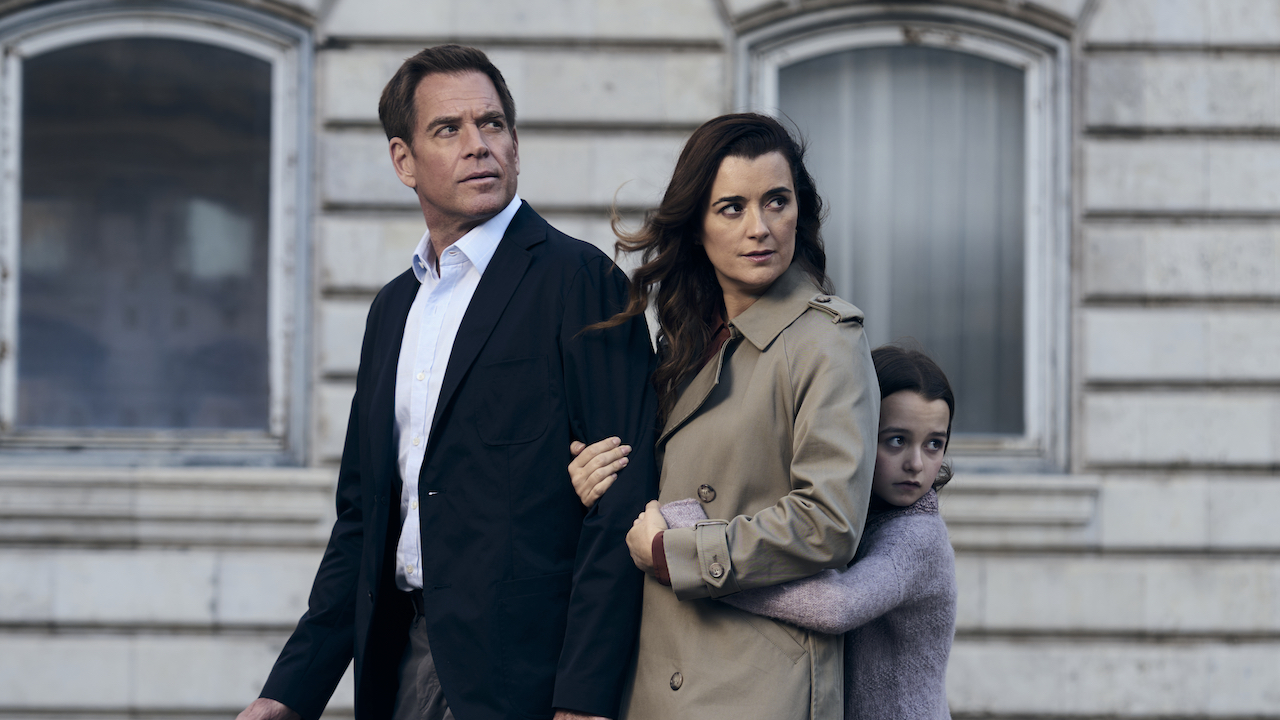How Game Of Thrones Led To Thor: The Dark World
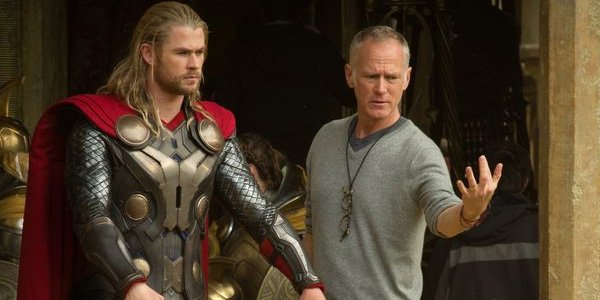
If you watch a good amount of television that means you’re probably familiar with director Alan Taylor’s work. Working on the small screen since the early 1990s, Taylor has helmed episodes of some of the greatest shows in modern TV, including Mad Men, The Sopranos, The West Wing and Law & Order. But of all of those jobs, it was his specific work on one series that inspired him to take on the upcoming Thor: The Dark World: his time on the hit Game of Thrones.
Late last year myself and a small group of other film journalists flew out to London, England where we had the chance to visit the set of the upcoming Marvel movie and talk with Taylor about his work on the movie. Read on to find out not only how Game of Thrones led to the Thor sequel, but also how 3D is affecting the production, how Malekith and the Dark Elves came to be the film’s villain and much more.
It looks like the movie you’re making here looks like it has some distinct differences from Kenneth Branagh’s film. Was that almost like a pilot for this one?
Yeah. And it's funny you used the word "pilot." I've spent a lot of time in television, and, I'm a recovering TV director or whatever, but a lot of the television experience has applied well here because there is an episodic quality to it. It's volume two of something that's already been established. Like in television I try and put my stamp on what's already been established, and see what I can do to give it my sensibility a little bit. The Ken movie was very successful. He brought together an amazing cast and focused what could be a huge rambling mythology on varying intimate family relations - brother versus brother, father and son… that was all brilliant.
The only qualm I had with his movie was the look of it. To me it felt too shiny and too brand new. And I understand all the choices. It's basically because the Asgardians, they were very much a futuristic alien race that we mistook for gods. And when I came in, I was in love with the Norse mythology. I was in love with sort of grounding it more into kind of a Viking or medieval look and a sort of a sense of history and weight and stuff like that.
So, Marvel seemed to have some interest in that as well, so coming off Game of Thrones where we sort of enjoyed combining fantasy with some sense of three-dimensionality and real life, that's what I tried to bring in here. It's a funny balancing act because you have to be funny in the way that Marvel's funny, and you have to be true to some pretty absurd things. You guys saw elves in spaceships [Laughs]. But then to try to make that relatable and real and textured and rich and stuff. So, in Asgard, for example, we're seeing the back streets of Asgard rather than the shiny, golden palace, and we go into some shiny palace rooms, but we tend to blow them up this time.
And on Earth, it's London. Trying to capture contemporary London. So, ideally, you'll have all the pleasures of something that feels real, but also all of the joys that go with a Marvel movie. We'll see whether we're pulling off this combination or not.
Your Daily Blend of Entertainment News
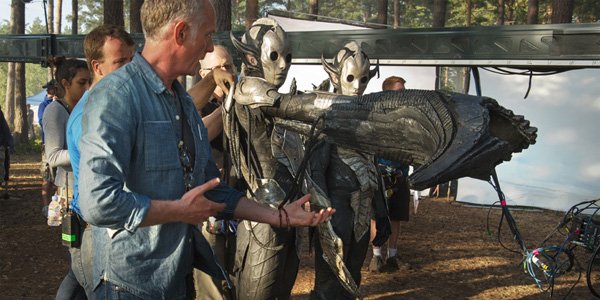
You mentioned you were a recovering TV director. Can you compare making a TV episode with making a feature film?
I could go on and on. It's partly television versus film, but it's also my experience, HBO versus Marvel. I've been sort of spoiled on the TV end, because HBO is small. It feels like a small institution, feels like we're making independent movies. There's respect for director's contribution in a way that mainstream television doesn't really reflect, I don't think. And Marvel, I came expecting the worst. I had a friend who had done a big, studio movie that was also a sequel and he e-mailed me at one point and said, "You have no idea. Nobody here gives a flying F what I think about it." [Laughs] So, I kind of came in braced for that, but it's been very, very different. Marvel, in its weird way, also is a small group, a small institution, so it's like you're making an independent movie that just happens to cost multi-millions of dollars. But it's a handful of people in a room, making the decisions. So that creative process is not that different. You're dealing intimately with the people that you're making the movie with. I haven't quite adjusted to the fact that they respect the director more in movies. I'm still used to deferring to… somebody [laughs]. And so it's been liberating and fun to have more fun than I'm used to, but at the same time, this is a huge ocean liner. And learning when you can and can't turn the ocean liner...
That's scary.
Scary is a good word for it [laughs]. Stressful. I have discovered new layers of stress I never knew existed. At the same time, the cast was wonderful. The crew was wonderful. I cannot complain about how I have been handled by Marvel. But, yeah, stress, absolutely. There is a Marvel process where the script is sort of the last thing that you get. Where I come from, a writer-driven medium, the script is the first thing you get, and then you get to do all of your directing after that. In this one, they seemed pretty comfortable with the script being the last thing to fall into place. So that's been the source of stress.
This movie is being released in 3D, correct?
Yeah. So we hear. I was walking to set, and the PA was reading something on their iPad. And, "oh, look, Disney says..." No, when I was getting involved I did not want to get into 3D. I'd seen some 3D things that made me unhappy and on the one side was the negatives with not being happy with what I'd seen, but on the positives were that I had been through a brief course with Sony and got really excited about the language that 3D can speak and realized that I would have to learn a lot to speak that language.
So when I came into this movie, it was very much a 2D movie, and I was kind of relieved that I wasn't going to have to speak a different language I hadn't learned yet. Partway through the process, as I guess is common – it was decided mostly for financial reasons. Markets are constantly being read to see what things are gonna pay off. So I think the decision was made that it was a good idea to do 3D. So we heard that partway through, and we are aware of it now. I am not radically changing the way I'm shooting it.
We'll see [laughs]. I mean, I think we have wonderful imagery. I think that's one of the great things about the Marvel universe is it gives you a chance to play with big, wonderful imagery, which hopefully will be a pleasure in 3D. But we aren't throwing spears at the camera any more than we were before. We'll see what happens.
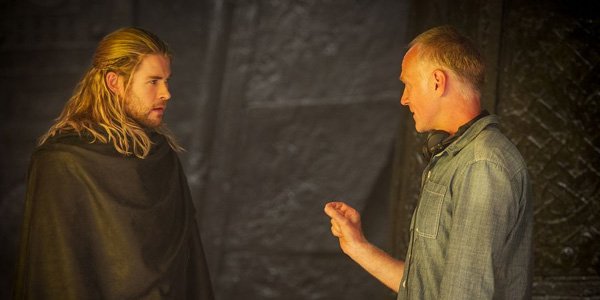
How much has the project shifted along the way from the beginning in terms of the story you're telling?
The story has shifted a lot, and that's part of the rollercoaster of having a script that was very much in flux. When I came, they had a first draft by an author. We immediately brought in a new writer and took it in a very different direction. I won't go into details what we thought of that draft [laughs]. But it's a wild and woolly path. Some things were agreed upon very early on, you know who our villains were gonna be, what the arc of Jane's relationship was gonna be, things like that were pretty much understood from the beginning. But there were characters in it now that were not in it, and I was sort of pushing to bring some people back that weren't originally coming back. And I still consider the script a work in progress.
With Joss Whedon being involved in this, did he get a look at the script?
No. He read a draft, and there was still some hope that he would come in and do some stuff on it for us, sort of under the table. Kind of, you know, now that he's the table [laughs]. So we were all hoping for that, but nothing -- he sort of gave his seal of approval on some things, but we haven't gotten a draft, as such.
Everyone here associated you with Game of Thrones. What drew you to want to go from that into this world?
I think it was partly that -- exactly the things that I've found myself enjoying on Game of Thrones. Game of Thrones was the first fantasy thing I've done, and like a lot of people who enjoy the show, watching it I didn't expect to respond to that world. But when I started doing it, I really started to love it; [I] started to realize that [it has] some of the things I'm naturally drawn to, like epic-scale imagery, [and] it's also grounded in these new relationships. And that's sort of what you can find in Thor as well. And there's this funny thing. I realize I've been drawn in, again and again, you know, when I did Deadwood, and when I did Rome, I love things that have one foot in history.
I was gonna be a history professor before I sold out and went into TV, so things that speak to me, that evoke that, it's really exciting to me. And Thor, even though he's a Marvel character, is also obviously deeply-rooted in Norse mythology. And you can see the look of our sets is deeply embedded or drawn from numerous sources and Celtic sources, and I just love drawing on past cultures. That's a thrill to me. I saw Avengers around the time – a rough cut, around the time that I was getting involved – and loved the balance to tones that Marvel does.
That they can make you really care, and they can make you laugh at what's just happened, and then they can… just when you think this is ridiculous, they let you know it's ridiculous. And that's a wonderful dance that they do. I saw some other films recently that only had one of those tones, and once you get used to the Marvel thing, you miss the other tones. In every scene, I saw The Avengers with my very young kids, the first laugh that came along, it was like they were like liberated. "Oh, we're allowed to laugh! I didn't know." [laughs]
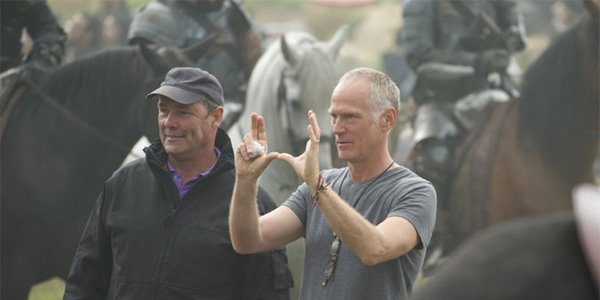
You’re using a lot of sets on this film. How do you do it? How do you decide on what gets done?
I mean, I think stress was mostly in prep, because then you're worrying about every possibly thing, but once you start shooting, you don't have any choice. You have to worry about tomorrow morning. That's mostly what you focus on. But, Game of Thrones, again, we were shooting in Croatia and Belfast and Iceland, more or less simultaneously, and so I got used to sort of having attention spread around. But also, you know, we'd have fantastic designers and a fantastic DP, and a lot of that stuff, you start to trust at a certain point.
Tell us about introducing a new villain like this one.
Yeah, let's see. It was clear early on that we were going to be dealing with the Dark Elves and that Malekith was supposed to be our guy. And, um... let's see. I'm trying to remember the process by which it evolved. He's very much on a mission of vengeance and reclaiming what is rightfully his. That's not an unfamiliar device. [laughs]
Early on I started thinking he's got something in common with Roy Batty [from Blade Runner], who had a righteous mission that you sort of sympathized with. Had a kind of humanity, even though he was an evil bastard. And, obviously, his name's escaping me, but the bad guy in J.J. Abrams' wonderful Star Trek. Very similar thing. Out to avenge something. So that sort of came along with him. It started getting more personal. I, being an American, I found myself bringing some Osama Bin Laden in [laughs].
Two things happened. His mission became grander and grander, and we sort of invented a time scale for where he's been and what his backstory is. We needed to make it big enough for Thor. Other superheroes can fight bad guys in Gotham City, or can fight bad guys in Metropolis, or whatever, but Thor is part of this epic thing he's also got going on. Our villains haven’t been around for about 5,000 years. They've been pissed off since the Big Bang.
So, there's a kind of scale. You know. Odin's father had to fight them. I liked, again, it's a history lesson, it's a scale to what his mission is, but also, on the other hand, trying to make it intimate. You saw him with Adewale, who's playing Algrim, who later become Kurse. It was important for me to give an intimate relationship, so you felt a kind of brotherly… you've got Thor and Loki, and you've got Algrim and Malekith. So you have some chance for a kind of an intimate connection. So it's not just mustache twirling and blowing things up [laughs].

Eric Eisenberg is the Assistant Managing Editor at CinemaBlend. After graduating Boston University and earning a bachelor’s degree in journalism, he took a part-time job as a staff writer for CinemaBlend, and after six months was offered the opportunity to move to Los Angeles and take on a newly created West Coast Editor position. Over a decade later, he's continuing to advance his interests and expertise. In addition to conducting filmmaker interviews and contributing to the news and feature content of the site, Eric also oversees the Movie Reviews section, writes the the weekend box office report (published Sundays), and is the site's resident Stephen King expert. He has two King-related columns.
